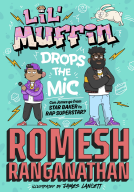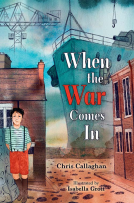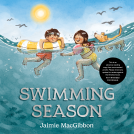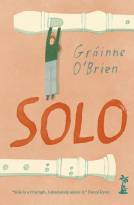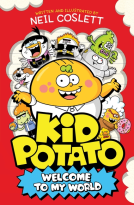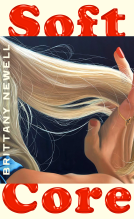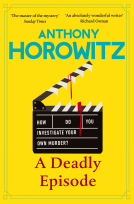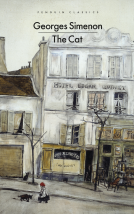
The Children's Home
by Charles Lambert
This title was previously available on NetGalley and is now archived.
Send NetGalley books directly to your Kindle or Kindle app
1
To read on a Kindle or Kindle app, please add kindle@netgalley.com as an approved email address to receive files in your Amazon account. Click here for step-by-step instructions.
2
Also find your Kindle email address within your Amazon account, and enter it here.
Pub Date 1 Feb 2016 | Archive Date 28 Feb 2016
Gallic Books | Aardvark Bureau
Description
A beguiling and disarming novel about a mysterious group of children who appear to a disfigured recluse and his country doctor.
Morgan Fletcher, the disfigured heir to a fortune of mysterious origins, lives on a sprawling estate, cut off from a threatening world. One day, his housekeeper, Engel, discovers a baby left on the doorstep. Soon more children arrive, among them stern, watchful David. With the help of Engel and town physician Doctor Crane, Morgan takes the children in, allowing them to explore the mansion … and to begin to uncover the strange and disturbing secrets it holds.
Cloaked in eerie atmosphere, this distorted fairy tale and the unsettling questions it raises will stay with the reader long after the final page.
Reviews
‘The Children’s Home is a not-nice sort of fairy tale, where the magic doesn’t sparkle prettily but boils and oozes, where the Prince has a face of tatters, where the children take grown-up revenge on their monsters. It is also, somehow, a searching, empathetic narrative about forgiveness.’ Owen King, author of Double Feature: A Novel
‘ …one book that I shall re-read and re-read again.’ Postcard Reviews
‘Charles Lambert’s novel is entirely original … highly compelling and invigorating writing.’ Lonesome Reader
‘This disquieting novel is surely one of the year’s most bizarre stories… Mr. Lambert’s subtle prose enhances the novel’s creepiness, as does his refusal to fully resolve or explain its many mysteries.’ The New York Times
‘Charles Lambert has crafted an exquisitely strange and deliciously dark offering … the narrative itself will haunt his readers well beyond the margins of its pages.’ High Voltage Magazine
‘The Children’s Home is a haunting Gothic in the vein of Shirley Jackson, steeped with the mystery and imagination of Neil Gaiman’s fairy tales. Lambert’s prose is beautiful and his tale is mesmerizing.’ Cementery Dance Online
‘A thoroughly original entry into the tradition of ghost stories, eschewing convention. … Compulsively readable, a one-of-a-kind literary horror story.’ Kirkus
‘The Children’s Home is the best kind of ghost story – one that scares, one that surprises … and one that you simply can’t stop reading.’ The Maine Edge
‘… definitely recommend this if you’re in the mood for something a little creepy.’ Bored to Death Book Club
‘The Children’s Home may well be the most surprising, thought provoking and also baffling book I’ve ever read.’ Bailieborough Library Reading Group
‘Lambert is a brilliant writer, and his absorbing new novel, The Children’s Home , is the best literary fiction I have read in some time.’ Seattle Book Mama
‘The Children’s Home is a powerful construction of creeping dread which skilfully keeps the reader off-balance at every turn.’ The Star
‘There is really nothing at all in this story that isn’t strange and that’s what I ended up loving about it.’ In a Good Book Room
‘A disturbing and thought-provoking novel’ Annethology
‘Mysterious and weird and just a great read!’ Rebecca Book Review
‘Charles Lambert could one day attain classic status.’ Maggie Gee
‘Beautifully written and crafted, and more compelling than many thrillers’ Daily Mail
‘A beautiful and uncanny novel by a writer who never ceases to surprise.’ Jenny Offill, author of Dept. of Speculation
‘This genre-bending debut is by turns dread-inducing and heartwarming, a masterful exploration of whether innocence can truly sprout from ignorance….a magical, mesmerizing tale about the courage it takes to confront the unknown.’ Booklist, STARRED review
‘Charles Lambert is a seriously good writer’ Beryl Bainbridge
Advance Praise
'Charles Lambert could one day attain classic status.'Maggie Gee
‘This genre-bending debut is by turns dread-inducing and heartwarming, a masterful exploration of whether innocence can truly sprout from ignorance….a magical, mesmerizing tale about the courage it takes to confront the unknown.’ Booklist, STARRED review
'Charles Lambert is a seriously good writer' Beryl Bainbridge
Available Editions
| EDITION | Other Format |
| ISBN | 9781910709009 |
| PRICE | £9.99 (GBP) |
Average rating from 86 members
Featured Reviews
 Reviewer 312073
Reviewer 312073
I received a free copy of this ebook through NetGalley in exchange for an honest review.
My feelings about The Children’s Home by Charles Lambert are a little ambivalent. On one hand I like the writing style, it reminds me quite a bit of Kazuo Ishiguro’s, Never Let Me Go. The author uses a disjointed method of revealing information and thereby, manages to build tension, in what is overall a slow moving book. When done by a talented author, the results are well worth the experience and Charles Lambert is talented enough to pull this off effectively. A lot of reviewers I noticed, complained about how slow moving the plot was, and how not everything got tied up at the end. This did not bother me, while I do enjoy everything getting tied up with a nice neat ribbon, I also enjoy reading books that imitate real life. As for the slow moving plot, yes, the story slowly creeps along to the denouement, but the story line was interesting enough to keep my attention and the book itself was short enough for the pace not to become overtiring.
So what didn’t I like about this book? It’s going to sound nitpicky, but I did not like the chapter headings. I am not a fan of the sentence at the beginning of the chapter, that describes what is about to happen, it ruins the suspense. Also, as much as I loved the atmosphere the author was able to create with his writing, the book could have used another pass through with an editor. There were some rough bits in the narrative, which if smoothed out, would make this book a four star read easily. I gave this book 3 1/2 stars.
 Mike D, Reviewer
Mike D, Reviewer
This book reads like a dream in the most literal sense of that, resplendent with strange beauty of narrative and dream logic of the plot. And for all that, to continue with the metaphor (or is it simile, since metaphor is an equation and simile is an approximation and I'm not quite sure which one applies here), much like a dream it seems somehow insubstantial, surreal and very odd. The basic story is that of a disfigured hermit whose reclusive lifestyle gets interrupted by children, dozens of them, randomly showing up to stay with him. It's actually all very intriguing because there's obviously something quite off about the situation and the reader tries to figure out what's going on, while getting lost in the spellbinding fairy tale for adults. It's only during the second half of it, when the explanations are starting to come to light, that the dream starts spinning out of control and you might want to wake up. Wake up with a major WTF was that as a first thought. Really. I'm a fairly adventurous and versatile reader, I've tried a variety of genres and some nontraditional narratives like bizarro and yet I still really do appreciate a coherent resolution to a story. This one is more of an interpretive one. Some allusions are made strongly enough to come through, some one can guess at or imagine. It's quite frustrating, because the book has so much potential and promise, to see it turn into something so ambiguously metaphysical. Very quick read, but ultimately not as satisfying as it might have been. Thanks Netgalley.
 Sarah R, Educator
Sarah R, Educator
Dystopian fantasy, with allegorical overtones involving genocide and exploitation. Ambitious and well-written, but the pacing occasionally drags and the plot is incohesive. The action in the second half of the book feels disconnected from what came before. This would work (and have a greater impact on the reader) if retooled as a short story.
 Media/Journalist 40463
Media/Journalist 40463
In an unknown time and place, a very wealthy man named Morgan who was once vain and beautiful but was disfigured in a terrible accident, lives a lonely existence, a hermit shut up inside the walls of his mansion. First a woman named Engel comes to him via his older sister, intended to help him, he thinks, working as his housekeeper although she seems to know much more about him than would a typical housekeeper.
Morgan's family is beyond wealthy. It is powerful and well-regarded in a city that is mired in war - civil? We can't be sure. But beyond the walls of Morgan's estate are armed guards, a ministry that vaguely "takes care" of children, extreme poverty and hunger. Because he has shut himself up and away, Morgan has no contact with the outside world.
But then one day, the outside world comes to him, invades his sealed-in home. A child appears. Then another. Moira and David are the first to come but soon more arrive. He cares for them, as he has never had a wife or family, along with Engel, who feeds them happily. Oddly, though, they seem to disappear just as easily as they appear. Sometimes Morgan questions his sanity: are the children really in his home? Did he make them up? Some of them, particularly David, seem far wiser than they should be at such a young age. He wonders too where they came from and if they are runaways or orphans, if there are families missing them.
As the story progresses, there are definitely elements of horror, a few scenes that I had to read more than once, "Did I just read what I think I did?" But the horror of the story is quiet and brooding. I can see why Shirley Jackson might be referenced: her Hill House is similar in tone although she never used the grotesque. Still, I get that.
To me the story felt like one Kafka might have written (although again without the horror aspects). There is something Josef K about Morgan. He falls down a rabbit hole with the children and it's hard for him to get out. No one speaks their minds fully and completely. There are fragments of sense and we wonder, as Morgan does, whether the children are real. At times I wondered if any of them were real - Engel, Dr Crane, etc. And I loved that!
For some readers, the ending might feel like a letdown, with no clear cut happy ending or devastating ending. It ends with a question, and one that some readers might feel should have been answered. I liked it. But then I love Kafka. I love being in a time and place that is everywhere and nowhere and possibly the 20th Century or even the 19th and maybe it's an alternate universe altogether, a timeline that never happened.
Thanks to Netgalley for the arc to review.
 Reviewer 314288
Reviewer 314288
A horror novel quite unlike any other, The Children's Home has a wonderfully dark and brooding atmosphere that only builds through the story. The sens of isolation, loss sand gust permeates every part of the novel and yet beyond the darkness there is more than a glimmer of light. Lambert does a great job of showing the ambiguity of human morality. Whilst the protagonist is by no means an archetypal hero and the children are not victims waiting to be rescued, one still gets a sense that there is a message about the inherent goodness of mankind behind it all.
The story itself is chilling, with moments of pure horror that are enough to keep people awake for days. Unlike a movie there are no cheap thrills, no jump scares. The horror is of the slow creeping kind, a passage may seem innocuous one first reading but then a the mean slowly reveals itself, you realise just how terrifying the situation is.
some people may find the lack of a conclusive ending disappointing, I personally enjoyed the fact that this book produced more questions than it answered.
 Rebecca L, Reviewer
Rebecca L, Reviewer
I was provided a free copy of this book in exchange for an honest and fair review. This book tells the story of Morgan Fletcher, who was horribly disfigured years ago in a tragic family event. Since then he has hid himself away in his family home, trying to hide his face from the world. He realizes that his face causes fear and disgust and this is something he simply can not deal with. At some point he acquires Engel as his housekeeper, though how she came to find him he is yet unsure. And then after awhile children start showing up at the house, orphans who are in need of a home. And miraculously these strays seem to form a family together, and Morgan is grateful that his new family accepts him as he is and they are not frightened by his mangled features. And then Morgan meets his new friend Crane, a doctor who comes to care for one of the children when they are sick. Crane also is not frightened by Morgan and together they form a deep friendship.
After awhile though Morgan starts to notice something different about the children that live with him. They don't make very much noise (for children) and they always seem to disappear until someone is looking for them. They seem to already know all about Morgan and his estranged sister and the rest of their family. Morgan starts to question where they all came from and how they came to find him, hidden away in a country estate. Overall I thought this was a great book. It was mysterious and weird and interesting, just everything you could want in a book. I'm still not 100% sure that I understand everything that was going on at the end but I think that's mostly because I had a lot of outside distractions going on, I might need to read the last like 20 pages again. And honestly I really want to discuss this book with someone else that's read it because I do think there are some points that the author leaves open for interpretation and I would just love to get someone else's thoughts on it.
I thank NetGalley and the publishers Aardvark Bureau Books for granting me access to this eARC. Charles Lambert is a good writer, the scenes and character descriptions are vivid. The Gothic novel creepiness in so good, a sense of tension and anticipation is there throughout that grabbed me as a reader but then the end made no sense. I still do not understand the story that I just read.
 Beth L, Reviewer
Beth L, Reviewer
I'm not exactly sure what I just read but it was definitely different. The idea started out interesting but devolved into. something confusing and messy. I did think the writing style was quite eloquent.
 Vikki H, Reviewer
Vikki H, Reviewer
Fantastic! It kept me going from the first chapter onwards, and had some amazing character revelations etc.
Definitely one to recommend.
 Sean F, Reviewer
Sean F, Reviewer
This is going to be a challenge for me to write a good review on this book. I honestly didn't understand the ending as I've noticed it applied the same to the other readers. But I can easily tell you I love the writing style in this novel. It was completely different from what I usually read. It took me a while to get used to the writing style, but once I did. I fell in love with it. Until I reached the ending, it wasn't that clear. I felt like I missed something. I was positive that it was as clear as possible and I just missed it. I think the book ended that way was to force us, the readers, decided what kind ending we desired it to be.
I think the children were simply a ghost. But again, that was my opinion. The novel was really creepy in a good way. It made me shuddered with how the author amazingly described what was happening and what were the children and the adults thinking. The book cover really did define the novel, including the title. David was beyond the creepiest and weirdest child. The more I read about him the more weirdness I felt. He did have his own tantrum just like any other kids, but there was a switch that could easily flip up, turning him into an adult in an act way not in the appearance. He was twelve years old acting as if he was a couple decade older.
There were a lot of showing than telling in the novel and that helped me imagine them in my head as if I was in the novel. If this novel was made into the film, I would watch it in a heartbeat, especially the scene where they went to find more children. That was the most terrifying scene. I had to read the same page a couple times to make sure I actually understood it correctly. I wish I could say it on here, but I would spoil it. It was the main point of the story. Everything that had been happening from the beginning to the ending had a reason for it.
Morgan was a fragile character. He was tortured in a much unexplained reason. It scarred him for life. He'd barred himself from the people. From the world. When the baby first showed up at his home, his life was changed for something he would never see it coming. The scene about the wax disturbed me deeply. But wax was there for a reason. It had awakened Morgan.
Doctor Crane was an interesting character, but he was also fragile to the world without realizing it himself. He was the most important person to Morgan. It was the same with Engel, the housekeeper. Although, I didn't get a chance to learn more about Engel and she was still a mystery character to me when I finished the book.
All in all, this novel was creepy as I repeatedly said it. I definitely would recommend you to give this book a shot, but be warned...you may not like the ending since it didn't exactly tell you what had just happened.
 Ola C, Reviewer
Ola C, Reviewer
It is really hard for me to review this book. I have no idea what to think about it. I am somehow disappointed that it was so mysterious and nothing was said clearer, and that after all we do not find out that exactly happened, what are the children, what is done in the factory? But at the other level it was great reading it. It is written so beautifully, and all the strange events seem nearly normal. It is a hard read that I think is requiring from a reader decoding of some of the hidden motifs. I didn't get them fully, so this is why I feel a bit frustrated at the end, that the author did not decide that his readers need everything to be explained in a clear manner.
It is definitely a strange, a bit creepy fairy tale, with a moral at the end. But it leaves me with so many questions. Does anyone have a proper interpretation of the meaning of the story? I'd love to know. It's like books back in school, when after reading the book I felt just 'wft?', but after analysing it with someone smarter everything started to make sense
This is an elliptical and mysterious story, but one which manages to be powerful at the same time. Written in an oblique way, there is much that we aren't told, which we have to discern or simply accept as unknowable. There are certainly elements of myth and fairy-tale - the damaged man, the mysterious companions, the appearing children, the problematic mother - and woven into this are elements of more recent and troubling histories. Images abound: of blood, of bodies, of masks, of roots and rootedness, and they operate in both positive and negative fashions.
Ultimately, the strength of this short book, I think, comes precisely from its elusiveness, the way in which it is impossible to pin down and narrow to a single coherent story and interpretation. Reading it reminded me of those hallucinatory poem-stories: Rossetti's Goblin Market, some of Browning's dramatic monologues, even Ginsberg crossed with a bit of Plath.
This may not be for you if you want coherency and resolution, but if you enjoy the weird, the lyrical and intimation rather than conclusion then this is dark and haunting.
 Arlene A, Reviewer
Arlene A, Reviewer
this tale is gripping and disturbing. Where you can lose the grasp of reality through the eyes of the main character. The sequence of events that constitute the body of this novel, can be considered cruel, fantastic, courageous, weird, frightening and sad.
 Reviewer 286890
Reviewer 286890
This is a beautifully written book. It reminded me almost of a fairy tale.
We open with Moira arriving at the house. Engel, the housekeeper we later learn, finds her and presents her to Morgan. We have no idea about Morgan's disfigurement,not at first, and how much this has affected his life. He agrees to keep Moira and soon more children appear. We don't know how or why the children are appearing, but Morgan decides to keep each one.
I found Morgan intriguing. We really don't get a sense of how his life was before the children until the children are there. We don't really know or understand his loneliness until we see how happy he is when Moira touches him as though he isn't in any way different from anyone else. How he just can't be without her only because she accepts him for who he is now. This is true of all the children, but Moira is the first to come and to do this and this changes Morgan. It gives him a quiet strength. On a side note- I almost picture his disfigurement like that of two face in the Dark knight movies- only the burns on his cheek and mouth area not as severe as Harvey Dent's in that film.
It's interesting that Morgan would assume Engel was sent by his sister. It's logical but at the same time his sister never really did anything for him so why start now? Then the children start appearing and he doesn't really question it at first. He just accepts that they are there. He really only starts to truly think about it when he sees one appear out of thin air.
Then there's Dr. Crane. He essentially leaves his practice to come live on Morgan's estate. It makes you wonder if he really had much of a practice before. That he could so easily leave it behind. Yes- he leaves 1 day a week to do whatever he does but you don't find out what this may be. However, if he had a practice and other patients he would have to leave more often and he doesn't. It makes you wonder what is really going on.
Morgan's sister, Rebecca, is kind of a peripheral figure for most of the book. She is mentioned repeatedly mostly in Morgan's thoughts and memories. You do not get a sense of who she is other than how she is envious of Morgan due to how their mother treats him as compared to her. I do wonder what would drive her to be comfortable with the family business. You would almost expect Morgan to be in the mindset to be ok with it. He spent so much time with his mother who seemed ruthless and selfish, the qualities that would appear to be what is needed to be ok with that business. However, it's Rebecca who has this type of personality and Morgan who is "softer."
The world of this book is well developed. Granted, that world is very small as it is Morgan's world. This consists of his house and the grounds- the gardens, boathouse and lake. It is a world of loneliness and shame and powerlessness. The thing is, I don't think Morgan is fully aware of it until the house is full of people. Then, it isn't until the house is empty again that the full realization hits. At that point, it isn't quite how it was at the beginning as Morgan has realized the power he has in his disfigurement and his, almost, acceptance of it.
You do wonder exactly what Morgan's grandfather's business really involves. When you find out, it is a bit disturbing and I still wonder exactly what they were going to do with those children that were truly becoming part of the earth? The ones that rip apart if you try to dislodge them. One can only imagine.
I am not sure why this is classified as horror. It really doesn't fit this category. Maybe it was thrown in this category due to the ending- the children in the earth and how they are ripped apart. It just doesn't seem to fit this book though.
Overall- this is a beautifully written book. The world is well developed and the characters are interesting. I like how we get to know them- little by little as the story progresses and the past isn't all thrown out there at once.
This is an odd book. I think people will have a hard time describing it, or telling what it is about without giving away the whole story. I think the blurb that compared it to Neil Gaiman's writings said it best. It really is that odd quirky writing that Neil does, that makes you think you understand what is going on, but don't in the end. I enjoyed reading this, and really did want to know what was going to happen.
Midwich Cuckoos and The Beast
One of the great strengths of Charles Lambert’s eerie, unsettling short novel is that he sets up an odd world, one which seems inherently plausible but he does not attempt to dot the is and cross the ts of logic. There is sufficient day to day, detailed reality to carry the fantastical elements, and the writing style, which eschews whimsy and the ethereal, rather serves to underline the strange normality of its weirdness. This means that the odd and the more usual versions of ‘reality’ sit alongside each other in a kind of delicious tension of opposition
Morgan Fletcher is the heavily disfigured scion of an extremely wealthy family, whose strange family business goes back for at least a couple of generations. The reader (and Morgan himself) is not quite sure what the family business was – some kind of world trade, as his grandfather amassed all sorts of strange travellers’ curios from far off lands.
Something has happened, some kind of breakdown in society, and Morgan lives in isolation. His wealth means there are various retainers and servants about the place, but no one sees Morgan except his housekeeper, Engel, who arrived some time ago. Outside the walls of Morgan’s empire, there were at some point violent encounters between citizens. We assume as a result of some kind of apocalyptic collapse of society. Various myths have probably circulated about Morgan’s terrible disfigurement, and it’s quite possible that everyone is as afraid of seeing the terribly damaged man as he is of being seen. So one myth which Lambert’s book is hinting at is ‘Beauty and the Beast’ – and of course, in the fairy tale, the Beast is actually possessed of far more beauty in his soul than most of the ‘unbeastly’, of unexceptional physiognomy. There are mismatches between the outward mask and the inner beings of many. And Morgan is clearly a good man. However, children begin to arrive at his domain, no one is quite sure from where, or indeed, why. And Morgan’s goodness is shown by the fact he gives them sanctuary. And, pleasingly, the mysterious children are not repelled or frightened by his damaged appearance. Instead, they trust him.
The children are not quite what they seem. They have some curious abilities – their ferocious intelligence, their speeded up development, for one thing. Another literary memory being used is John Wyndham’s The Midwich Cuckoos. The reader, like the children, like Morgan, begin slowly to become a little less sure of their own, or anyone else’s agenda. There is also a ‘good doctor’ who comes initially to take care of the children’s health, and a firm friendship develops between Morgan and Crane, as they try to understand where the children have come from, who they are, and what is the purpose which Morgan is playing out in their lives.
There are also sinister forces outside, figures of authority, who threaten the children.
Lambert’s great skill is to start his story in the sweet and light, and by increments to turn those lights down, to create shadows, twilights, rustlings, and slowly leave the reader feeling more and more unsettled and uneasy.
As others have noted, this book crosses genres – it is a literary fiction, post-apocalyptic, science fiction-ish horror fantasy, digging around in dark myths and imaginings.
And its knotted up genres are brilliantly woven together. Lambert leaves the reader (well, for sure he left this one) with the feeling that there are probably further allusions to be found. There is some very dark and shocking stuff – but the darker Lambert gets the more delicately and subtly he describes things. He understands that less is far, far more, he really done
“it set me thinking about those books we were given to read as children, about travellers and shipwrecked sailors. How they found themselves in strange lands. magical lands where time went backwards or animals spoke their language. But they weren’t strange or magical to the people who lived there, were they? The people who lived there were normal. How formless it all is until an outsider gives it form”
I recommend this strongly – and suggest it is best read when the nights are still quite long, for full uneasy hairs up the back of the neck effect!
I was very happy to receive this as an ARC, from the publishers, Aardvark, via NetGalley. This is the second book I’ve read from Aardvark – on this showing, a most interesting publisher, going outside the mainstream
 Angel H, Reviewer
Angel H, Reviewer
Morgan has become horribly disfigured and lives by himself except for his housekeeper Engel. Morgan doesn't really do much but catalogs books in his library.He is alive but not “ living”. Then children start appearing at his house. The first being a baby named Moira. Then more come until there are seven children with the oldest being David who is a very old five. Morgan just seems to accept the kids in his life now even grows to love them and assumes charge of them. But he seems to keep himself on the edge just watching the kids laugh and play. the children seem to have some oddities but Morgan accepts that also. Then Moira becomes ill and Dr Crane is called. Morgan and Dr Crane become friends and Dr Crane ends up moving in also. organ eventually tells Dr Crane how he was scarred. Morgan also tells Dr Crane his sister runs the family business and he hasn’t seen her since he was nine. This story was just odd. You weren’t really told alot . It’s pretty short for a novel also. It also kinda keeps you hanging in the end and I definitely do not like that. This wasn’t a really enjoyable story for me too many things left unsaid type thing. It just didn’t make sense in parts of the story. At the end I wondered what the ending was suppose to mean. Anyway I didn’t really care for this story hence the two.
 Esmee d, Reviewer
Esmee d, Reviewer
If you like your stories a little creepy, but not so creepy that you will want to put the book in the freezer, then The Children's Home by Charles Lambert will be right up your alley.
In The Children's Home we follow Morgan, heir to a 'power-empire', who lives in an unnamed city as a recluse. Morgan hides because he's disfigured, this being the result of a very dysfunctional childhood. Now that he's all grown-up, he lives alone in his parents' house until out of nowhere Engel appears. She's an angelic nurse, taking care of Morgan the best she can, like a gift send from the heavens. Morgan loves having her around too much to actually wonder who send her. She seems to always have been part of his life, knowing exactly what to do and where to go. But it doesn't take long until the children start to appear. They come from all over, appearing out of thin air and move into his house. These children are pleasant as well, seem wise beyond their age and vanish whenever Morgan has enough of them. Then around 40 kids later, a wax-model of a woman and a visit to his sister, things turn creepy.
The best thing about The Children's Home is definitely the atmosphere. The opening chapter mysterious, but setting the scene perfectly. Lambert is definitely a skilled writer and the eeriness that exudes from Morgan's world is almost tangible. Morgan himself is a little bit of a sad-sack, but understandably so. I loved how passive he was, letting Engel take over his house, adding children left and right while he just sort of sat back and watched her do it. The novel kicks into gear when one of the children get sick and Doctor Crane enters the stage. Morgan at first hides from the doctor, but soon they become friends and Morgan confides that he feels like something strange happens in his house. Together they try to solve the mystery of the children, but the actual story Lambert is telling is beyond these two men. As David - the first child that arrives - tells them: 'You aren't so important [...] It's what we do now that matters, not what we are.'
And the children definitely take action, unlike the two grown-ups. The end of the novel is a little bit of a wild ride and moves very quickly after a slow setup. But don't expect any answers about the children, where they come from and what goes down in that factory they visit. If you like a story that gets neatly wrapped-up and feeds you the information you need, than The Children's Home will drive you crazy. I'm still not entirely sure what I read and what it all meant, but somehow I feel like I wasn't supposed to. The sense of mystery is what makes this work strong. Lambert throws in small details here and there that show you that the world he's describing isn't ours. Homes are surrounded by fences, cities have ceased to exist and somehow children are needed to make power. I found this novel unsettling - especially the ending - and definitely recommend this if you're in the mood for something a little creepy that you can read in a day. The story itself might not satisfy you completely, but it will definitely make your skin crawl.
 Keith C, Media/Journalist
Keith C, Media/Journalist
Lambert is an incredible writer with excellent character profiles that spark off the page. The plots are well devised and intriguing that keeps the writer entranced as they work the puzzle of why the children are showing up and what exactly is the reasoning behind this.
His detention to detail and descriptive passages are extremely rich with incredible detail. The dark fairy tale plot devise is well used and carries the plot forward to its conclusion.
This is unfortunately where the book lets itself down with an uneven conclusion that is more puzzling than the mystery that steers the plot. It felt that the author had become tied up with the plot that he wasn't quite sure what to do about the conclusion. It's a shame as if the conclusion answered some of the mysteries that it presented, this would have easily been a five star book but do to the conclusion difficulties, it unfortunately settles down to a three star. Shame, because if it an answered just a few of the questions it raised, this would have been a solid winner.
I'm writing about Charles Lambert's The Children's Home because I finished it a while back and I'm still thinking about it. And I can't figure out how I feel about it. It's weird. Weird can be good. It's creepy, and creepy is often great. I'm just not certain there was enough substance to carry the weight of the creep and the weird to the finish line. The ending fell somewhat flat, and while normally that would irk me to no end, I can't say I didn't enjoy the ride. Despite feeling a bit unfulfilled, I didn't dislike the book. In fact, I actually really liked it. Which might be the weirdest thing of all.
So why did I pick up the book? Hello?! Have you seen this cover? (More on that later, but really, look):
Morgan Fletcher is a shut-in (where and when is anyone's guess), living alone in his family's mansion behind a wall erected during earlier, troubled times (of which we really get no real description or explanation). Morgan has lived this way, without interaction from the outside world, since a disfiguring childhood incident.
Years later, a woman named Engel shows up to tend to him and the house, an idea Morgan presumes is the brainchild of his estranged sister, Rebecca, since Engel seems to know so much about him. Shortly thereafter, odd kids of all different ages start showing up on the property out of nowhere. Often creepily (as if there's any other way, but still, just to be clear):
One morning, shortly after breakfast, Morgan was standing by the drawing room window and gazing out into the garden when a square of air above the lawn seemed to ripple as though it were silk and a knife had been drawn across it, and a child appeared on the lawn and began to walk towards the house, perfectly confident, it seemed, that she would be received. As she was.
If you are watching and loving the original French version of the television series The Returned (running on Sundance and available through Netflix), then this book is probably your jam. Imagine a bunch of little Victors showing up out of nowhere and inhabiting the mysterious old house of a scarred recluse, disappearing and reappearing seemingly at will, and just when said recluse needs quiet or thinks of them.
So the kids are now part of the house, and they wander around finding weird things, sometimes seriously eerie and bizarre things, things undiscovered even by Morgan, who has lived in the house his entire life. Morgan wonders about the kids, *I* wondered about the kids. There is constant kid-wondering throughout the book:
He knew there was a mystery about these children, and not only in the nature of their arrival, but he pushed the thought aside.
There are times I think they were all together before they came here, whenever they were, wherever that was.
"It's as though they came from the air," he said.
Young David may be creepiest slash best of all. He learns to read and soon enough wants to, and does, teach the others, regardless of their age. Then they start studying Morgan's library. David constantly references something foreboding, something he wants to "be a surprise." He is the source of passages like this:
Why should I have spoken to David? With a sense of fear he couldn't understand, he wondered, And what would David have said? Do I need David's consent before I do things? Who is he? What does he want from me?
A moan of disappointment rose from the backseat, but David turned round swiftly and hushed them. "He's right. Not yet," he said. "We're still not ready." "Ready for what?" said Morgan. David was normally so patient. But this time he said, "How many times must you ask and not be told before you stop? Why can't you just wait?"
The Doctor shivered as David reached into the pram and gathered something in his arms. The children sighed with pleasure and the Doctor gave a short, involuntary cry, like a bark, which sounded to him as though it had come from someone else, from somewhere close by. David was clutching a severed head to his chest.
Intrigued now, aintcha? Just wait until David starts saying, "The time will come. You'll see."
The the men in the black car show up. OMINOUS. I really had little clue what was going on. I'm still not sure I have a clue what was going on. But the story and the writing were so atmospheric, and the ambiance of menace hung about so wonderfully, and the arc of magical realism was just so funnily bizarre that I'm not sure I mind as much as I would normally.
I marked a ton of passages and still enjoy them so much I can't narrow them down to quote a few here. As I read each one for this review, I thought, "Oh yeah, that was great, but what in the ever-loving hell WAS IT and how do I explain it?" There is an ending, though I'm not sure what exactly it was. I'm not selling this very well, am I? I'm not sure I should be. And yet it was kind of awesome, and I want someone to read this and tell me that they don't get it either but they liked it as much as I did. So, someone get on that, eh?
STREET SENSE: I'm not even sure what to say here, other than I read this book several weeks ago and it is still the cause of curiosity for me. I have enjoyed reading over the passages and being reminded of the feelings I had when I read it. Confusion, angst, anticipation, more confusion. If you like atmospheric, creepy reads, get on this one. Then explain it to me.
A FAVORITE PASSAGE: He imagined himself the dirty secret at the heart of the world, the overlooked madwoman raving in the attic of a house that occupied everything there was, each brick and pane and board, the wondering prince in the hair-filled mask of iron he had dreamt of as a boy and never been able to forget.
COVER NERD SAYS: I was sold from the cover of this one before I knew the first thing about the plot (which is about the same as I know now - bazinga!). I can't even really describe how much and why I love this cover. It's so evocative of danger and violence, yet also artistic and beautiful. A mix of natural and man-made with a hint of devastation rolled in. It also reminds me of this picture I took of some burned bushes near my house, which were both ugly in their burned devastation and beautiful where the burnt ashy skin had broken and the new red surface was showing through. I think I'd best go before you all find out I'm as weird as this book.
 Reviewer 298993
Reviewer 298993
I wasn't sure what to expect when I started this book, but I was pleasantly surprised. The story line was solid, the world building was good, it was easy to read. Oveall I did like it. I would recommend it. 4.5 out of 5 stars.
 Cara F, Reviewer
Cara F, Reviewer
Morgan Fletcher has been a recluse since the incident with his mother that left him disfigured. He wanders the family country estate with only his trusted housekeeper, Engel, for company. Then one day a baby is left on the doorstep of his home, Engel takes the child in and before they know it the house is filled with children.
When one of the youngsters becomes ill, Dr. Crane is invited to the house and although Morgan hides from him to begin with, he soon finds a unique friendship with the young doctor.
As the family continues to grow, Morgan starts to worry about some of the children's strange behaviour, even Dr. Crane becomes unnerved by them. Then there's the first question that needs to be answered, where did all the children come from?
The Children's Home by Charles Lambert is a beautifully twisted Gothic fairytale, perfect for fans of Miss Peregrine's Home for Peculiar Children by Ransom Riggs and Tim Burton's The Melancholy Death of Oyster Boy. Instead of it's darkness originating from gore or horror tropes it oozes between the pages from tone, atmosphere and setting, allowing it to gently unnerve you rather than simply turning your stomach.
A devastating past, creepy children and wax works with a life of their own make this a great read but the weird and wonderful ending make it truly memorable. I can easily see this novel being snapped up for TV or film adaptation and it couldn't come soon enough! Original, bizarre and beautifully written The Children's Home by Charles Lambert is not to be missed.
 Mary V, Librarian
Mary V, Librarian
A weird and wonderful book! I have no idea how to describe it.
 John L, Reviewer
John L, Reviewer
A superlative little read, that should stick with the reader a very long time, if she can engage with its weirdness. Not that it gets too outre, mind – it has a lot of logic within itself, and common-day occurrences that compel you to take on the weirder elements just the same. The title place is a mansion of sorts in a large, walled estate, in some weird, war-torn place in some weird, European-seeming country, but in some weird world where the sun rises from the west and sets in the east, as we at one point discover. Once home to solely a businessman with a most unusual upbringing and now isolated due to his facial disfigurement, and his main servant and cook, it has suddenly found itself refuge to a copious amount of foundling children, some delivered in baskets anonymously to the door, some appearing as if out of the ether.
The European aspect rings true because the book bears comparison with so many Euro-arthouse works. There's the isolated, faded glory of the mansion, peppered as it is with Middle Eastern rugs and so on, as if this is the Duke of Burgundy, perhaps. The businessman wears a mask, and I was reminded of the book that became that Almodovar film about face-swapping. But throughout, this book is solely its own entity, suggesting it would make a powerhouse film of distinction were it to be taken up for one. It has arresting visuals throughout, weird beats that act as brilliant cliff-hangers, and just everything to both make you anxious to read on but duty bound to find where this remarkable writing will take you.
 Eric A, Reviewer
Eric A, Reviewer
I had a somewhat alarming experience when reading “The Children’s Home” where I felt increasingly anxious as the story progresses. It’s a novel that accumulates a tremendous power in its surreal tone over time when reading it. I felt a shift in perspective as I became immersed in the dark fictional world Charles Lambert created in the story and this carried on into how I see the world around me. It inspires that special kind of disquiet where you start to question everything around you and these are uncomfortable questions that you aren’t sure you want answered.
The novel focuses on Morgan Fletcher who has barely ever ventured out from living in a palatial estate he’s inherited from his family. Morgan exists in virtual solitude except for a group of unseen servants who he has virtually no contact with because of his horrendous facial disfigurements which he’s ashamed of. He isn’t entirely sure where his family’s wealth came from, but he’s content to spend his days cataloguing the huge array of books stored in the property. Even though he claims not to read them his conception of himself is highly literary: “He imagined himself the dirty secret at the heart of the world, the overlooked madwoman raving in the attic of a house that occupied everything there was, each brick and pane and board, the wondering prince in the hair-filled mask of iron he had dreamt of as a boy.” In this way he comes to represent a sort of everyman, but one who is entirely estranged from a mysterious world which functions independently around him.
A new servant arrives named Engel who cooks for Morgan, but she eventually also takes on the role of child-minder as soon as young children start arriving at the house from unknown sources. Morgan takes them all in gladly because “It has never been a house that welcomed love… Not until now.” There are soon so many children he isn’t even certain how many there are. Their presence is welcome at first, but the intelligent children seem to have a mysterious purpose of their own and they lead Morgan into facing uncomfortable problems about this world that’s been consumed by war and greed. Together with Doctor Crane who first comes to treat a sick child and eventually lives at the house semi-permanently, Morgan is shown the secrets which dwell within his own house and the sinister factory managed by his domineering estranged sister.
This is an enigmatic novel imbued with haunting imagery that accumulates meaning over the course of the story. For instance, in an attic room there is a model of a pregnant woman in a box who is strangely life-like and was presumably used as a tool for medical research. She comes to represent issues of fertility, beauty and the future of civilization. This unnerving figure also makes an alarming counterpart to Morgan’s own vain and horrifically tyrannical mother who was plagued by a debilitating illness.
It’s clever how the book embeds you so firmly in Morgan’s perspective of the world where he feels like a guilty participant, but also he’s utterly confused by what’s really happening and impotent to make any substantial change for the better. Isn’t this how most of us feel in the world? If we’re living in a middle class first-world society we’re bombarded by news stories of far-off tragedies and feel like we’re inextricably a part of damaging systems in which we benefit by receiving privilege and comfort. There is a guilt attached to this and a nibbling unconscious knowledge that we resist. It’s described of Morgan how “He’d never wanted to know, which is also a sort of knowing.” Morgan remarks to an eerily sophisticated boy named David how his family’s wealth came from dealing in power. He means in energy like oil and electricity, but it also takes on the meaning of power as influence and domination over society. Charles Lambert seems to be making sly critiques of capitalism in a subtly artistic way where lives are being crushed in a consumer system. There are also small nods to Marxism such as the female servant named Engel.
Reading this book I was reminded strongly of Paraic O’Donnell’s recent novel “The Maker of Swans” because of similarities in its setting, dreamlike logic and linguistic inventiveness. The experience of reading “The Children’s Home” is like watching a David Lynch film or staring at a painting by Hieronymus Bosch. Everything is seductively peaceful but has a sinister edge so that when you investigate it closely you see the unfathomable pain that was always there in plain view. In truth, Charles Lambert’s novel is entirely original and I’m just drawing upon references to other art works to give a sense of the journey you’re in for. This is highly compelling and invigorating writing.
 Reviewer 252384
Reviewer 252384
When I started reading this book, I thought of the kids movie - Despicable Me. In Despicable me, the big bad guy hides away from people, and then suddenly he has to look after some girls, and he changes. For the better.
The book started out as a sweet read, with a warm fuzzy feeling and I ended up feeling less fuzzy - all the sweetness had a sinister twist to it!
Great read and very entertaining!!
 Marjolein E, Reviewer
Marjolein E, Reviewer
I've been postponing this review for weeks now because basically I still don't know what to say about it.
It was by far one of the weirdest books I've ever read. But not in the weird way that I usually quite like. No, I was wondering for almost the entire book if I wasn't somehow missing what was going on and what the purpose of the complete story was.
Morgan lives secluded from the world in his big house together with a bunch of children and a doctor, but while you get the feeling something is wrong right from the start, it doesn't really progresses from me.
I didn't enjoy reading it. I never really got into the story, and for most of the time I was just waiting for something to happen. Like I said, I felt like I was missing the point of the book and the ending felt weird, even after the rest of the book. I'm sure there are people who will like this book, but I myself can not recommend it.
Thanks to the publisher and Netgalley for providing me with a free copy of this book in exchange for an honest review!
 Reviewer 189601
Reviewer 189601
This book has such an intriguing premise and although it starts out a bit slow, things pick up quickly. Anyone going into reading The Children's Home should just bury whatever expectations they may hold about what will actually take place, where the story is taking place, and exactly what is going on - because there are many answers that even when provided, may not clear things up entirely or provide a satisfactory ending for readers who prefer concrete and explanatory endings versus surrealism and endings open to interpretation. I enjoyed the book, and I think the short length helped, but perhaps a bit more length could have provided room for a conclusion that would be a bit more satisfying for realists and fantasy lovers alike.
Readers who liked this book also liked:
Carine Laforest;
Children's Fiction
Vanessa Guevara
Children's Fiction, Multicultural Interest, Parenting, Families, Relationships



